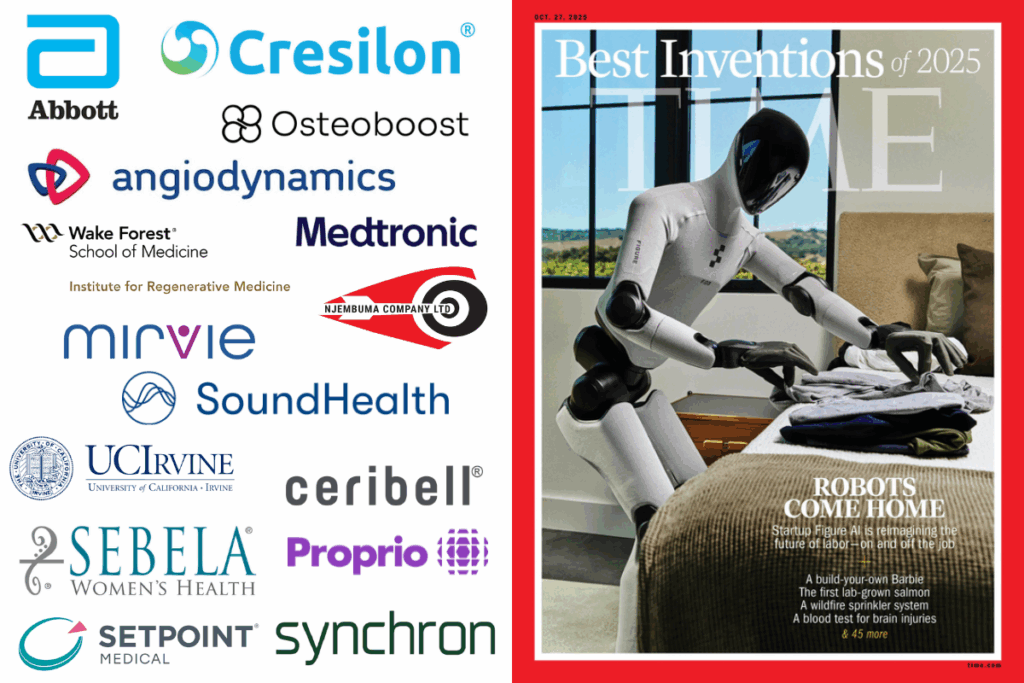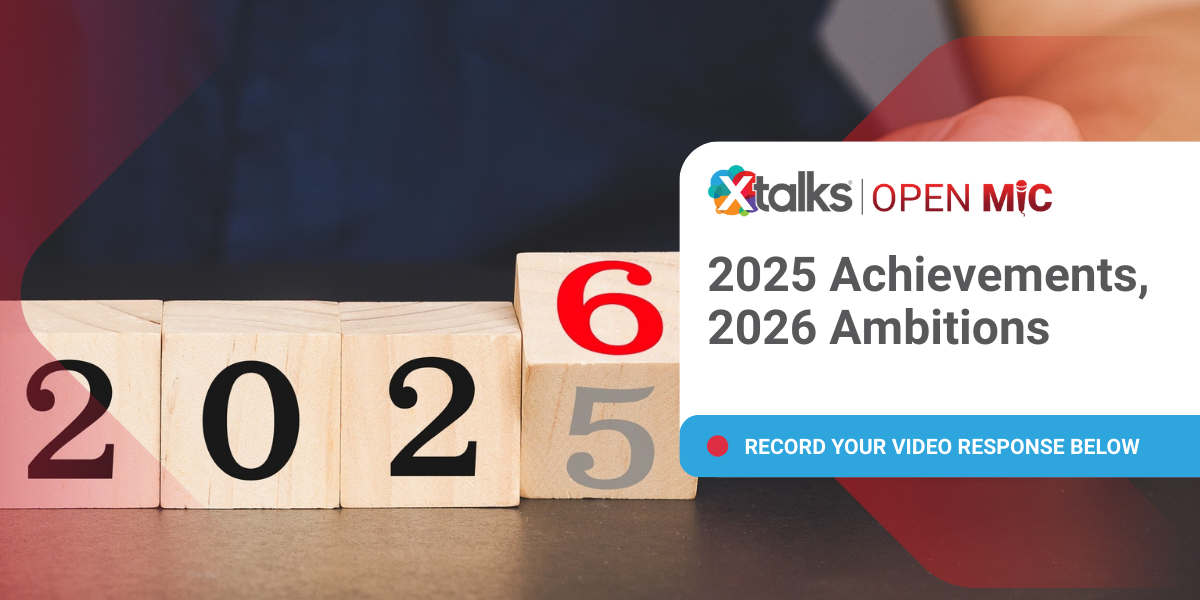The AI in medical diagnostics market is growing rapidly, expected to reach $8 billion by 2032. Companies are combining sensors, robotics and neural engineering to reimagine how clinicians diagnose, operate and monitor outcomes.
KPMG’s Medical Devices 2030 outlook points to a sector shift from hardware innovation to intelligent systems, where sensors, data integration and predictive analytics form the new foundation of value.
From diagnostics and neuromodulation to regenerative medicine, devices are becoming smarter, more connected and personalized to clinical workflows.
In our blog, we delve into some of the most unique medical device inventions featured in TIME’s Best Inventions of 2025.
i-STAT TBI Whole Blood Test (Abbott)
Abbott’s FDA-cleared i-STAT TBI test brings rapid concussion assessment to the bedside, producing lab-quality results in 15 minutes from a whole blood sample. Run on the portable i-STAT Alinity system, it measures two brain injury biomarkers — UCH-L1 and GFAP — to help clinicians decide if a CT scan is needed. The test is to be used up to 24 hours after injury.
NanoKnife System (AngioDynamics)
Using irreversible electroporation (IRE), AngioDynamics’ NanoKnife system provides a minimally invasive, heat-free method for prostate tissue ablation. Results from the 121-patient PRESERVE study, published in European Urology, showed 84% of men free from in-field disease and 96% maintaining urinary continence at 12 months.
3D-Printed Liver Tissue (Wake Forest Institute for Regenerative Medicine)
Researchers at Wake Forest Institute for Regenerative Medicine (WFIRM) are sending 3D-printed liver tissue to the International Space Station (ISS) aboard SpaceX’s Falcon 9 to study whether microgravity improves nutrient flow and durability in bioengineered organs. The project uses vascularized constructs that mimic natural blood vessels. Earlier earth-based tests kept the tissue viable for 30 days.
Clarity Point-of-Care EEG (Ceribell)
Ceribell’s FDA-cleared Clarity algorithm is the first AI-powered EEG system approved to detect electrographic seizures in patients as young as one year. The portable Ceribell system delivers real-time alerts that support faster diagnosis and treatment. Data from the multicenter SAFER-EEG study showed that Ceribell use was linked to shorter hospital stays and improved functional outcomes.
Traumagel (Cresilon)
Cresilon’s Traumagel is a plant-based hydrogel cleared by the FDA for temporary external control of moderate to severe bleeding. Available nationwide, it’s being used by first responders and trauma teams to stop bleeding within seconds. The Cobb County Fire Department reported 16 lives saved since adopting Traumagel in April 2025.
BrainSense Adaptive Deep Brain Stimulation (Medtronic)
Medtronic’s BrainSense Adaptive Deep Brain Stimulation (DBS) is the first closed-loop DBS system for Parkinson’s disease. The device adjusts stimulation in real time based on brain activity, improving symptom control and reducing overtreatment. Results from the ADAPT-PD study, published in JAMA Neurology, indicated strong patient preference over conventional DBS.
Miudella (Sebela Women’s Health)
Sebela Women’s Health’s Miudella is the first hormone-free copper intrauterine system approved by the FDA in over 40 years. Designed for up to three years of pregnancy prevention, Miudella uses a flexible nitinol frame and less than half the copper of traditional IUDs while maintaining 99% efficacy. In clinical trials, it showed low expulsion and discontinuation rates, suggesting likely improved comfort and tolerability for patients seeking hormone-free contraception.
SetPoint System (SetPoint Medical)
SetPoint Medical’s FDA-approved neuroimmune modulation device is the first implantable therapy for rheumatoid arthritis (RA). The SetPoint system delivers targeted electrical stimulation to the vagus nerve to reduce inflammation in patients who are unresponsive or intolerant to biologic and synthetic disease-modifying anti-rheumatic drugs (DMARDs).
Synchron + Apple BCI Integration
Synchron made history as the first brain-computer interface (BCI) company to achieve native integration with Apple’s iPhone, iPad and Vision Pro devices. Using the BCI Human Interface Device (HID) protocol, Synchron’s Stentrode implant enables individuals with paralysis or motor impairment to control devices with their thoughts. It’s hands-free and voice-free.
Osteoboost (Osteoboost Health)
Osteoboost is the first FDA-cleared prescription wearable for low bone density, offering an at-home approach to slowing bone loss in postmenopausal women. The device delivers targeted vibration therapy to the spine and hips, areas most prone to osteoporotic fractures. Osteoboost showed in clinical trials an 85% reduction in spinal bone density loss and an 83% reduction in bone strength loss with regular use.
Sonu Band (SoundHealth)
The Sonu Band from SoundHealth is the world’s first FDA-approved, AI-enabled wearable device for at-home treatment of nasal congestion and allergies in children ages 12 and up. Using acoustic vibration therapy, the Sonu Band gently delivers personalized sound frequencies that help reduce swelling and open nasal passages. It’s a drug-free alternative to traditional steroid-based medications.
Memory Air (Science Lab 3/UC Irvine)
Developed from UC Irvine research, Memory Air is a scent-based device that enhances memory consolidation during sleep through targeted olfactory stimulation. The over-the-counter device releases a curated sequence of 40 scents to activate neural pathways linked to memory formation, providing a non-invasive solution for aging adults and those with cognitive concerns.
Encompass (Mirvie)
Mirvie’s Encompass blood test analyzes cell-free RNA to assess placental health and identify pregnancies at high risk for preeclampsia. The blood test could reduce preventable complications and improve maternal outcomes. WINMaternity, a leader in preventive pregnancy care, has expanded its maternal health program by integrating the Encompass blood test for the early prediction and prevention of preeclampsia.
Objective Blood Measurement Drape (Njembuma)
Developed by Kenya-based Njembuma, the Objective Blood Measurement Drape enables early detection of postpartum hemorrhage (PPH). In Kenya, as part of Kenya’s national E-MOTIVE protocol, the calibrated drape measures blood loss precisely, triggering rapid response bundles that have cut severe bleeding by 60% and reduced maternal deaths by one-third.
Paradigm AI Surgical Guidance Platform (Proprio)
Proprio’s Paradigm platform is the world’s first AI-driven surgical guidance system to deliver real-time intraoperative measurements without radiation. The system fuses computer vision and 3D imaging to guide surgeons with precision and capture data throughout procedures.
If you want your company to be featured on Xtalks.com, please email [email protected].












Join or login to leave a comment
JOIN LOGIN